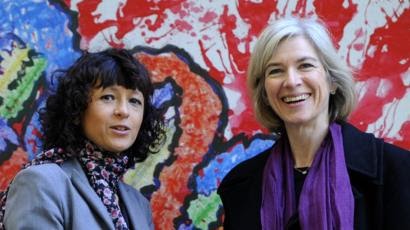Women in STEM: Two Scientists Awarded Nobel Chemistry Prize for Gene Editing Tool

Emmanuelle Charpentier (L) and Jennifer Doudna (R) | Image courtesy of Getty Images
Two female scientists, Emmanuelle Charpentier and Jennifer Doudna, have been granted the 2020 Nobel Chemistry Prize for their contributions towards the technology of genome editing. Declared this month of October, the announcement marks the first time two women have shared the science Nobel. They developed a method for genome editing, Crispr-Cas9, also referred to as “genetic scissors”, allowing researchers to make precise alterations to the DNA contained in animals, plants, and microorganisms.
Since their discovery, scientists have applied the technological innovation to genetically modify and create crops, develop cures for conditions like sickle cell disease and hereditary blindness, and disarm other viruses by cleaving their DNA. Some researchers have even tried to bring species back from extinction using Crispr. “This technology has utterly transformed the way we do research in basic science,” declared Dr. Francis Collins, director of the National Institutes of Health
Evidently, this scientific breakthrough has ignited controversy in the science community because of its potential to alter human heredity. In fact, the world’s first genetically modified infants were developed using genetic scissors to edit the genes of human embryos. The Chinese scientist responsible for this experiment, He Jiankui, received severe criticism from several individuals in the respective field, deeming his trials as irresponsible and dangerous. The Chair of the Nobel Committee for Chemistry, Claes Gustafsson, mentioned how “there is enormous power in this genetic tool which affects us all”, raising ethical and scientific questions. In September, an international panel of experts published a report declaring science has not advanced enough for such experiments to take place.
As background, Emmanuelle Charpentier received her PhD at the Institut Pasteur in Paris, while Jennifer Doudna received hers from Harvard Medical School. The two met each other in a cafe in Puerto Rico while attending a science conference, and they immediately began to collaborate to decipher how Crispr operated. They found that they might be able to harness the RNA molecules to seek out and alter any piece of DNA by synthesizing a piece of RNA that targeted an area on any gene. Scientists proved their theory in 2012.
When Dr. Doudna was asked about how she felt as an accomplished woman in the science field, she responded with stating that she is first and foremost a scientist, yet recognizes that “for many women, there’s a feeling that, no matter what they do, their work will never be recognised as it might be if they were a man”. She claimed how she wanted to see that change, presenting her achievement as a step in the right direction. Similarly, Dr. Charpentier hoped that their victory would send a positive message to young women aspiring to follow the path of science, and “to show them that women in science can also have an impact through the research that they are performing.” The valuable work Charpentier and Doudna dedicated towards Crispr-Cas9 has revolutionized the molecular life sciences.

Anushka Elavia is currently a senior at West Morris Mendham High School - Class of 2023. In school, she is a Class Officer for Amnesty International/ UNICEF...







